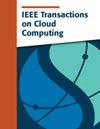Deadline-Aware Online Job Scheduling for Distributed Training in Heterogeneous Clusters
IF 5
2区 计算机科学
Q1 COMPUTER SCIENCE, INFORMATION SYSTEMS
引用次数: 0
Abstract
The explosive growth in training data and model sizes has spurred the adoption of distributed deep learning (DL) in heterogeneous computing clusters. Efficiently scheduling distributed training jobs in such heterogeneous environments while ensuring they meet user-specified deadlines remains a critical challenge. While most existing works focus on reducing job completion time in homogeneous clusters, they pay little attention to meeting job deadlines in heterogeneous clusters. To address this issue, we propose异构集群分布式训练的截止日期感知在线作业调度
训练数据和模型规模的爆炸式增长刺激了分布式深度学习(DL)在异构计算集群中的应用。在这样的异构环境中,有效地安排分布式培训工作,同时确保它们满足用户指定的最后期限仍然是一个关键的挑战。虽然现有的大多数工作都集中在减少同构集群中的作业完成时间,但他们很少关注异构集群中的作业完成时间。为了解决这个问题,我们提出了Dancer(有效资源利用的截止日期感知动态GPU分配方法),这是一个新颖的框架,在整个训练生命周期中,不仅动态调整分配给每个作业的GPU的数量,而且动态调整GPU的类型。Dancer的目标是在异构GPU集群中最大限度地满足其截止日期的作业数量。它将工作分配与资源分配解耦,并将最大限度地满足限期作业数量的调度优化问题表述为整数线性规划(ILP)问题。为了实时解决这一ILP问题,我们提出了一种利用原始对偶和动态规划技术的具有竞争比率保证的在线算法。基于真实深度学习工作负载的大量跟踪驱动模拟表明,Dancer明显优于最先进的方法,将截止日期满意率提高到58.9%-74.2%。
本文章由计算机程序翻译,如有差异,请以英文原文为准。
求助全文
约1分钟内获得全文
求助全文
来源期刊

IEEE Transactions on Cloud Computing
Computer Science-Software
CiteScore
9.40
自引率
6.20%
发文量
167
期刊介绍:
The IEEE Transactions on Cloud Computing (TCC) is dedicated to the multidisciplinary field of cloud computing. It is committed to the publication of articles that present innovative research ideas, application results, and case studies in cloud computing, focusing on key technical issues related to theory, algorithms, systems, applications, and performance.
 求助内容:
求助内容: 应助结果提醒方式:
应助结果提醒方式:


